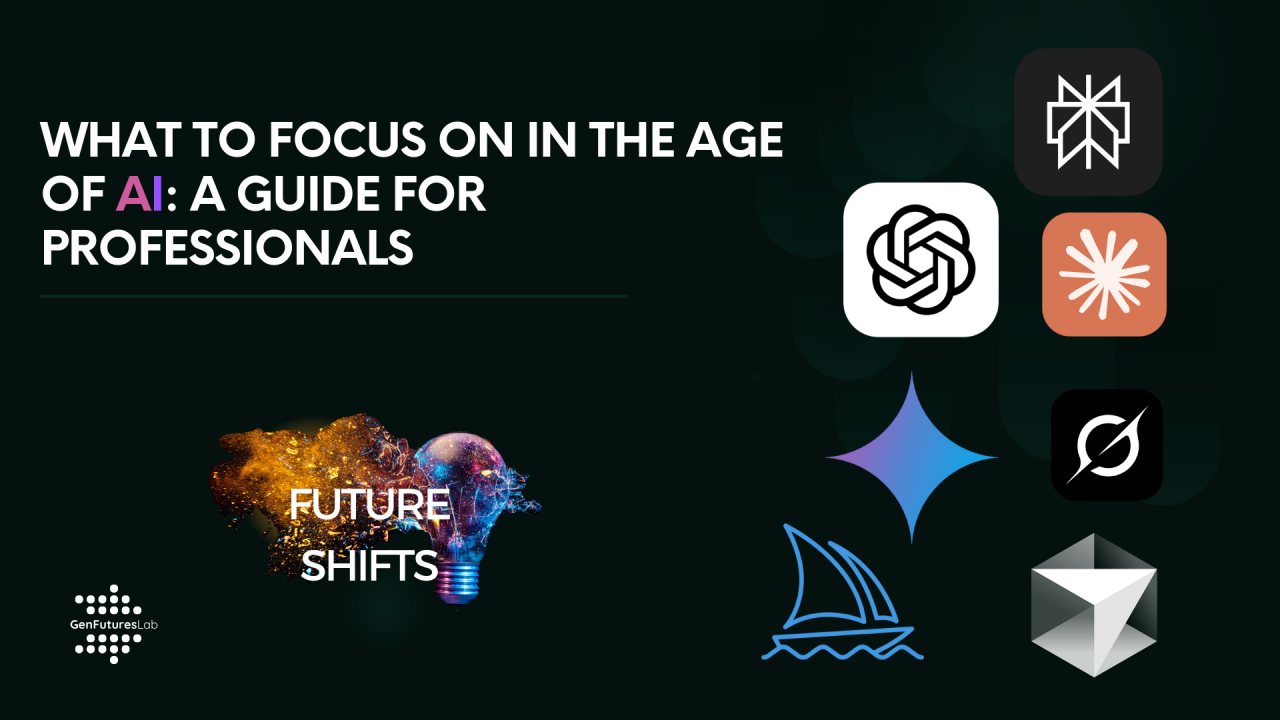What to Focus on in the Age of AI: A Guide for Professionals
Former Sky, BBC & HP, is an AI thought leader who helps organizations rapidly adopt AI, drive measurable ROI, scale innovation, and foster AI literacy across diverse industries.
As artificial intelligence (AI) reshapes industries at breakneck speed, professionals are facing a pivotal shift. While AI opens doors to powerful new tools and possibilities, it also disrupts old ways of working. The question isn’t whether change is coming, it’s how to stay ahead of it.
The answer? Stay curious, keep learning, and adapt fast.
This week, we draw from conversations happening at the highest levels of tech leadership, including a recent interview at Queens’ College, Cambridge, where Google DeepMind CEO Demis Hassabis advised students to “learn to learn.” That advice rings even louder for those already in the workforce.

Why Upskilling Matters More Than Ever
AI is already automating routine tasks, rewriting job descriptions, and reshaping decision-making. A 2023 report by the World Economic Forum predicts over 50% of employees will need significant reskilling by 2027.
Across industries, professionals are adopting AI agents: specialised tools or workflows that automate repetitive or complex tasks. In customer support, agents handle common queries before humans step in. In real estate, agents qualify leads and generate property descriptions. Even consultants and solopreneurs are building lightweight agents to manage scheduling, research, or lead generation.
In this environment, relying on past expertise is no longer enough. Professionals must actively upgrade their skillsets, especially in areas where humans can complement what AI can’t do on its own.
What to Focus On Now
1. Digital and Data Literacy
Understanding how AI and data tools actually work is foundational. You don’t need to be a coder but knowing the basics of machine learning, analytics, and prompt-based systems gives you the confidence to work with AI, not fear it. A McKinsey report ranks digital literacy among the top skills for the future of work.
2. Critical Thinking and Strategic Judgement
AI is a powerful assistant, but it doesn’t think for you. Professionals must know how to frame the right questions, interpret AI outputs critically, and apply sound judgement, especially when outcomes are ambiguous or high-stakes.
3. Emotional Intelligence and Communication
While machines take over the repetitive tasks, human interaction becomes even more valuable. Leading teams, resolving conflicts, and influencing decisions all rely on soft skills like empathy, storytelling, and active listening.
4. Creativity and Cross-Disciplinary Thinking
AI can remix existing content but it can’t truly innovate. The best ideas often come from connecting dots across domains. Professionals who blend creative thinking with cross-functional knowledge will drive the next wave of innovation.
Lifelong Learning Is the New Baseline
The old model of “study, then work” is dead. Today’s professionals need to treat learning as a career-long habit - something that runs in the background of everything they do.
Bill Gates captured it well:
“We always overestimate the change that will occur in the next two years and underestimate the change that will occur in the next ten.”
This is the decade where that long-term change arrives and those who stay curious will thrive.
Here’s how to stay in learning mode:
- Take short, targeted courses.
- Attend workshops, webinars, and conferences to stay plugged into your field.
- Follow smart thinkers across disciplines — not just in your niche.
- Experiment with AI tools hands-on. Use them in your work and see where they can accelerate you.
Adaptability Is Your Edge
Adaptability means more than just coping with change: it means leaning into it and it is what allows professionals to move fluidly between roles, industries, and tools. A product designer might become a prompt engineer. A strategist might experiment with vibe coding - a new form of prototyping where visual and interactive ideas are expressed using tools like ChatGPT or AI video, skipping traditional design software altogether.
If that sounds overwhelming, remember: adaptability is a muscle. It strengthens with use.
To build it:
- Reframe change as an opportunity, not a threat.
- Develop a growth mindset - treat every challenge as a chance to learn.
- Say yes to stretch projects. Get comfortable with being a beginner again.
Practical Steps You Can Take This Week
- Do a quick skills audit - what do you need to learn next?
- Set a 30-day learning goal (e.g. get hands-on with ChatGPT or Midjourney).
- Try automating one task you normally do manually.
- Talk to someone in another department or field - and learn how they use AI.
- Join an online community or newsletter (like this one) that keeps you ahead of trends.
Need Help Figuring That Out?
At GenFutures Lab AI, we help professionals like you stay sharp and strategic with AI. From our coaching programs to workshops, we make learning practical, fast, and fun.
.svg)



.svg)
.svg)
.svg)
.svg)

.svg)

